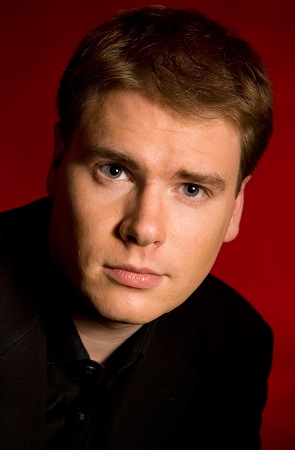William Boyce's quasi-dramatic concert work Solomon, termed a
‘serenata’, did much to ensure the composer’s rise to prominence in the
1740s, and was performed annually between 1742 until 1761. Thereafter it
had a distinguished performance history until the early nineteenth century,
when increasingly conservative audiences deemed its libretto - derived from
the Song of Solomon rather than the account of the king’s reign
given in I Kings and II Chronicles as adapted in Handel’s oratorio on the
same subject - overly lyrical and sensuous. The Musica Britannica
edition also informs that Solomon featured alongside other
large-scale choral works by Boyce in a festival of the composer’s music
held in July 1749 at Cambridge University when he was awarded his doctorate
in music - a striking honour for an English-born composer at a time when
Handel was at the peak of his powers.
Boyce’s Solomon has little in common with its Handelian namesake
though. It is a secular dialogue between an unidentified He and She, which
seems - on the evidence of the excerpts offered - to have little to do with
the biblical monarch. Curnyn, leading from the keyboard, directed a stylish
and observant account. After a bright-toned overture for strings and oboe -
a taut and sprightly opening, racing Allegro and flowing,
dignified Larghetto - there followed a sequence of recitatives and
airs in which soloists Mary Bevan and Benjamin Hulett revealed for us the
delights of Boyce’s melodic invention.
Hulett’s tenor was direct and dramatic in the first Air, ‘Fair and Comely
is my love’; he enjoyed the amorous audaciousness of the text - the imagery
is replete with ‘wanton locks’ and ‘flowing lips’ - and created a strong
sense of character. The spreading chords of an exciting and restless
theorbo continuo (Josep Maria Marti Duran) enriched Bevan’s recitative
response, ‘Forebear, O charming swain, forebear’, and her subsequent air,
‘O fill with cooling juice the bowl’, leapt across the registers with
agility and strength, the sprung rhythms of the octave strings and trumpets
(David Hendry and David Carstairs) having established an intense and heated
mood in the instrumental introduction. Bevan’s soprano is bright and clear,
and has alluring warmth at the bottom, and she brought real human feeling
to the air.
The duet, ‘Together let us range the fields’, lilted with bucolic ease, the
slithering runs in the fiddles suggesting the carefree frivolity of the
lovers. At first, She followed His lead, then the roles reversed, before an
ecstatic melismatic climax. The gentle accompaniment of Hulett’s final
recitative, ‘My fair’s a garden of delight’ prepared for the delicious
closing aria, with chorus (8 singers including the evening’s soloists), in
which the shimmering strings and woodwind obbligato painted a steamy
picture of summer’s ‘southern breezes’, ‘blooming trees’ and ‘spicy
garden’, culminating in the choric assertion: ‘Ye southern breezes, gently
blow,/ That sweets from every part may flow’. Curnyn encouraged the voices
to retreat and then surge with the force of the breeze, imbuing the climax
with theatricality.
Boyce’s music has great charm but is no match for the stunning, beautiful
invention of Handel’s Alceste - clearly the work of a composer in
his prime, and a rare example of his incidental music for the theatre.
Dating from fairly late in Handel’s career, it was composed for a 1750
production of Tobias Smollett’s adaptation of Euripides’ dramatisation of
Admetus of Thessaly’s love for Alceste, a subject which Handel had already
set in his 1727 opera Ademto. In the event, it never made it to
the stage, but the surviving masque-like medley of fairly short songs,
chorus and instrumental numbers - none of which involve the main
protagonists - recalls the semi-operas of Purcell. The mixture is magnetic:
we have a wedding feast, an Elysian welcome scene, a descent to the
Underworld, and a euphoric endin - all of which delight.
Curnyn recorded Alceste for the Chaconne label in 2012, with
Hulett as one of the soloists, and the tenor did not disappoint here,
making a striking impact in his initial recitative, ‘Ye Happy People’, and
interacting with the chorus with energy and excitement in ‘Triumph, Hymen,
in the pair’. Hulett matched the agitation of the running violin
passagework in ‘Ye swift minutes ye fly’, singing confidently off-score and
with agility. He showed his Baroque credentials in the melismas, coloratura
and decorated cadences of ‘Enjoy the sweet Elysian grove’, trilling with
pointed brilliance.
After a sinuous aria, ‘Still caressing, and caress’d’, Bevan relished the
melodious beauty of ‘Gentle Morpheus, son of night’, with its soothing
string accompaniment and easeful phrases; Bevan had a good sense of the
scale of her voice in the Wigmore auditorium, and found surprising
oppositions of brightness and darkness in this lovely aria which manifests
all of Handel’s skill and sensitivity.
James Platt tapped both darkness and drollness in Charon’s display of
clumsy foolishness, ‘Ye flerting shades, I come’. The Chorus punched out
the text of the concluding ‘All hail, thou mighty son of Jove!’ with a
power to match the orchestra’s rhythmic rhetoric.
The vocal items were preceded by a robust account of Handel’s Concerto
Grosso Op.6 No.1 with section leaders Catherine Martin and Oliver Webber
whipping up a vigorous energy which, at the evening's close, found its
complement in the whirling symphonic conclusion to Alceste.
It was a pleasure to enjoy such suave and sure-footed playing and singing
by the EOC.
Claire Seymour
Early Opera Company: Christian Curnyn (director), Mary Bevan (soprano),
Benjamin Hulett (tenor), James Platt (bass)
Handel: Concerto Grosso in G major Op.6 No.1 HWV319; Boyce: Excerpts from Solomon; Handel: Alceste HWV4.
Wigmore Hall, London; Wednesday 29th March 2017.
